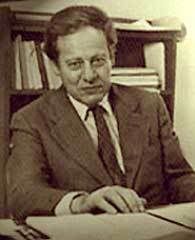More Deconstruction
 From Paul De Man's "Semiology and Rhetoric":
From Paul De Man's "Semiology and Rhetoric":"It is not true that [a] text can simply be reduced to the mystified assertion that our reading deconstructs. The reading is not "our" reading, since it uses only the linguistic elements provided by the text itself; the distinction between author and reader is one of false distinctions that the reading makes evident. The deconstruction is not something we have added to the text but it constituted the text in the first place. A literary text simultaneously assesrts and denies the authority of its own rhetorical mode, and by reading [a text in such a manner we are] only trying to come closer to being as rigorous a reader as the author had to be in order to write the sentence in the first place. Poetic writing is the most advanced and refined mode of deconstruction; it may differ from critical or discursive writing in the economy of its articulation, but not in kind.
But if we recognize the existence of such a moment as constitutive of all literary language, we have surreptitiously reintroduced the categories that this decosntruction was supposed to eliminate and that have merely been displaced...
Any question about the rhetorical mode of a literary text is always a rhetorical question which does not even know whether it is really questioning. The resulting pathos is an anxiety (or bliss, depending on one's momentary mood or individual temperament) of ignorance, not an anxiety of reference...but as an emotive reaction to the impossibility of knowing what it might be up to. Literature as well as criticism--the difference between them being delusive--is condemned (or priviledged) to be forever the most rigorous and, consequently, the most unreliable language in terms of which man names and tranforms himself."

No comments:
Post a Comment